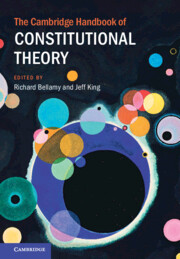Book contents
- The Cambridge Handbook of Constitutional Theory
- The Cambridge Handbook of Constitutional Theory
- Copyright page
- Contents
- Figures
- Contributors
- Frontispiece
- Preface and Acknowledgements
- 1 Introduction
- Part I Values
- Part II Modalities
- Part III Institutions
- Part IV Challenges for Constitutional Democracy
- Bibliography
- Index
- References
38 - Prerogative
from Part III. B - The Executive
Published online by Cambridge University Press: 27 March 2025
- The Cambridge Handbook of Constitutional Theory
- The Cambridge Handbook of Constitutional Theory
- Copyright page
- Contents
- Figures
- Contributors
- Frontispiece
- Preface and Acknowledgements
- 1 Introduction
- Part I Values
- Part II Modalities
- Part III Institutions
- Part IV Challenges for Constitutional Democracy
- Bibliography
- Index
- References
Summary
To examine prerogative is to reflect on how constitutions recast and reshape the story of their own creation. I argue that the term ‘prerogative’ specifies the rudimentary command function that underpins all constitutional order - or, more precisely, what remains of that command function once institutions of law and government have developed and stabilised around it. So understood, the central question becomes how best to understand the place of prerogative within the order of rules that the constitution provides. One answer presupposes the existence of a ‘sovereign prerogative’, that is, an ‘original’ authority inherent to government that is prior to and in some sense superior to law. I show how this model fails analytically and normatively. Another answer constructs prerogative as a set of general executive powers that are derived, enumerated and limited (‘constitutional prerogative’). This second model brings conflicting sources of normative authority into conceptual alignment. While this configuration does much to prohibit recourse to open-ended discretion - so reducing the likelihood of arbitrariness and disruption that tends to result from its exercise - it does not in itself prevent the rise of a prerogative disposition among ruling elites and their client groups.
Keywords
Information
- Type
- Chapter
- Information
- The Cambridge Handbook of Constitutional Theory , pp. 656 - 677Publisher: Cambridge University PressPrint publication year: 2025
